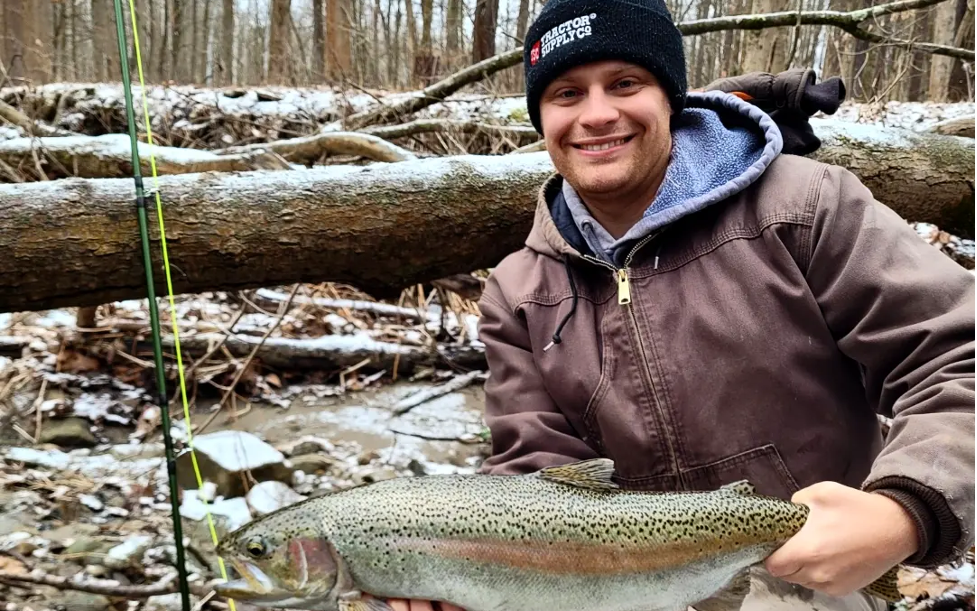Researcher Spotlight – Austin Lamica

2022-23 Global Change Fellow
PhD Student, Department of Forestry and Environmental Resources
Advisor: Dr. Rajan Parajuli
Every year the Southeast Climate Adaptation Science Center funds a multi-disciplinary cohort of Global Change Fellows representing colleges across NC State University. Here are some highlights about 2022-23 Fellow, Austin Lamica and the applied research he’s conducting.
About You
What do you study?
I study forest economics with a focus on forest products trade, markets, finance, management, climate change, and employment. Currently, my research covers climate change impacts on forest-based employment in the U.S. South. In this research I am attempting to quantify the impacts of historical precipitation and temperature on the various sectors of the forest products industry, and predict future forest-based employment under various future climate models.
What (or who) influenced you to go into this field of study?
I grew up in a small rural community that was heavily dependent on forestry and logging to support its livelihood. Growing up in that environment gave me both an interest and appreciation for the woods and its provisions, as well as working in forested systems. These interests led me to pursue a degree in forestry. My undergraduate advisor was a forest economist. Through working with my advisor I became passionate about the economic and business aspects of forestry, which inspired me to pursue it in my future studies.
What are three words your friends would use to describe you?
My friends would describe me as witty, adventurous, and passionate. In my spare time I love to explore my passions of hunting and fishing with my friends. Many of my friends would also acknowledge my ability to make them laugh with my witty comments tailored for almost every situation.
About Your Research

Who will benefit from your research?
Forest managers, policymakers, and individuals employed in the forest products industry will benefit from my research. They can use my research to inform management decisions, decide on prospects of future employment, and improve social welfare. More specifically, I hope that my research impacts communities like my hometown that are reliant on forests for their livelihood.
How can your research be used to inform management decisions?
The findings of my research can have implications for management decisions throughout the entire forest products supply chain. In particular, the results of my current research may inform management decisions surrounding timber harvest operations, such as harvest timing, equipment use, and best management practices, under the prospects of a changing climate in the U.S. South. Additionally, these results may have implications for forest products manufacturing sectors, such as changes in technology or production, as rising temperatures may influence worker productivity.
What results are you finding?
Preliminary results suggest that historical precipitation influences employment in the forestry, logging, and wood-based manufacturing sectors. My results also indicate that temperature negatively influences furniture, paper, wood products manufacturing, and additional aggregate sectors employments.
About Your Global Change Fellow Experience
What has been the most rewarding part or your favorite part of being a SE CASC Global Change Fellow?
My favorite part of being a SE CASC Global Change Fellow is all of the friends and connections I made in this interdisciplinary setting. I have enjoyed learning about all of the facets of climate change including the importance of a multi-disciplinary approach to addressing climate change issues.
What advice would you give to a student that is interested in getting involved in your field?
Talking to professionals who are forest and/or natural resource economists is a great starting place. Forest economics is a small niche field where everyone knows everyone. Talking to these professionals can help establish connections and guide you in your interests. Despite forest economics being a smaller field, the opportunities are endless. Even though the economics portion of this field can be math heavy at times, don’t let that discourage you. Practice patience, persistence, and resilience and you can succeed in anything you put your mind to.
What advice would you give to an incoming Global Change Fellow to get the most out of their experience?
This fellowship affords many opportunities and connections. Take advantage of as many as you can, especially those that you are interested in. Meet and talk to as many people as you can. It is imperative to keep an open mind and be willing to explore aspects not in your expertise while in this program. Even though not all seminars, conferences, or discussions will be directly related to your interest, keeping an open mind will certainly broaden your horizons and likely help your research in the long run. Finally, don’t hesitate to reach out to the mentors or other fellows; this is a very supportive and cooperative group.
- Categories:
